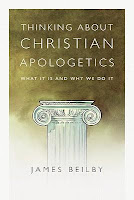Just as theology flows naturally from worship and confession, apologetics is the natural outcome of evangelism. At some point the Christian moves from proclaiming the Gospel to persuading the unbeliever; once this move takes place, the Christian has moved from evangelism to apologetics. In any case, the unbeliever will soon ask “why should I take anything you say seriously?” The Christian will have to state some reason for the hope that is within him; so his answer had better be good. Once we realise that apologetics is a natural part of the Christian life, the objections of the anti-apologist melt away.
Beilby gives sound advice in the course of the book. We might convince a person that the Christian faith is true, that she could commit her life to Jesus, and that this is the most important decision that she will ever make. However, saving faith only occurs when a person acts, committing herself to Christ. Even when someone is fully aware of the rational course of action, selfishness and pride can motivate a profoundly irrational decision. The reach of reason is surprisingly limited. Yet, if a person cannot be argued into faith, they cannot be “preached” or “witnessed” into the Kingdom either. Apologetics is no less advantaged than any other aspect of evangelism.
It is true that without the work of the Holy Spirit saving faith is impossible; but we must acknowledge that the Holy Spirit reasons with unbelief through Scripture. For example Paul opens his chief theological statement, the book of Romans, with a critique of idolatry and polytheism. The creator’s eternal power is revealed through the natural world; the author of this creation must be far greater than anything in the created realm. Therefore idolatry is irrational. If Paul’s example is normative, when we proclaim the Gospel we are obliged to argue for it also.
The Biblical warrant for apologetics is crystal. Famously, we have the command of 1 Peter 3 verse 15 and Paul’s example on Mars Hill. What we often fail to notice is the example set by Paul elsewhere in Acts (e.g. 17v2, 18v4, 19v8-9 and 20v7) where he is described as “reasoning” (dialegomai) with unbelievers. In his letters, Paul did not simply repeat the claims of the Gospel and pronounce that the Judaisers would be damned. Paul advanced powerful arguments for his message and he was not afraid to use reason to dissect unbelief.
Anti-apologists have made much of 1 Corinthians 2v4-5, where Paul says that “My message and my preaching were not with wise and persuasive words, but with a demonstration of the Spirit’s power, so that your faith might not rest on men’s wisdom, but on God’s power”. But Paul was not critiquing apologetics in this passage; his target was the Corinthians’ love of rhetoric. As Beilby points out
The point of 1 Corinthians 2:4-5 is that Pail did not want to present the gospel in the language of the trained orator who applied very specific and formal rhetorical skills and devices in order to persuade his audience. Such rhetorical devices were common among both the Jewish rabbis and the Greek philosophers. He didn’t want to win a battle of rhetoric and impress people with his argumentative skills….So there is nothing in this passage that suggests that using thoughtful, logical arguments in the service of defending and commending the faith is inappropriate.Yet Beilby is clear that apologetic arguments are not the grounds on which the Church bases its theology. We do not have to provide a set of academically respectable “proofs” before we can reflect on the love of God. He wisely draws attention to experientialist apologists who “call attention to the transformative powers of the Christian life.”
The Christian faith is not an abstract set of concepts to be believed but a life to be embraced, a life that includes all of the person – head, heart and hands, reason, emotion and will. The Christian idea of salvation involves a transformative relationship with the creator of the universe. It is not merely about one’s beliefs, because even the demons believe.He cautions that experiential factors are not enough, on their own, to ground a rational faith. Why should we privilege Christian experience over Muslim experience? How do we respond to evolutionary psychologists who attempt to explain religious experience away? Some response is called for, and it seems as if the apologist will need to appeal to the explanatory power of the Christian worldview.
In fact, Beilby points out that there is not an official or normative approach to apologetics; there are as many apologetic schools as there are apologists. The wise Christian will draw on the best writers, and his own experience, to give reasons for the hope that is within him. C.S. Lewis appealed to evidence and experience to make his case; Francis Schaeffer critiqued the presuppositions of the unbeliever, but he also drew attention to our spiritual desires, and pointed to theism’s explanatory power. Christians have a vast treasury of arguments to defend their faith; Beilby’s book helps us to realise that it would be a crime to ignore it.
Apologetics 315 Book Reviewer Graham Veale is Head of Religious Education at City of Armagh High School. With David Glass, he runs the apologetics group Saints and Sceptics. Their articles can be read at www.saintsandsceptics.org



















0 comments :
Post a Comment
Thanks for taking the time to comment. By posting your comment you are agreeing to the comment policy.